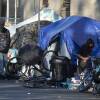Boston Mayor Michelle Wu has picked up the fight against the city of Quincy and the Native American tribes attempting to intervene in the legal dispute over a new bridge to Long Island, where the city wants to maintain the option of reopening services for homeless people and people with addiction.
The tension between Boston and Quincy has been broiling in court since 2018, three years after the Long Island bridge was destroyed due to safety concerns. The Chaubunagungamaug Nipmuck Tribe, bolstered by elected officials from Quincy, is seeking to preserve alleged burial ground sites on the island. The tribe and its non-lawyer representative began attempting to intervene in the case in the summer of 2019.
As the fight has dragged on, Boston has seen those who would have been treated on the island now concentrated in tent encampments in the area around Massachusetts Avenue and Melnea Cass Boulevard, known as Mass. and Cass.
On Tuesday, after touring the existing facilities on Long Island, Mayor Wu characterized the city’s December filing in the case as a “key legal step” intended to ensure Boston has the fullest range of authority available to address its homelessness and addiction crisis — including reconstruction of the bridge.
“That doesn’t necessarily mean that this is guaranteeing that those steps will happen,” Wu said, cautioning against the conclusion the bridge will return. “We’re looking from all angles on this.”
Wu has about a week before her self-imposed Jan. 12 deadline to clear people from Mass. and Cass tent encampments on the streets.
During the final stretch of last year's mayoral campaign, Wu indicated resistance to the fight to rebuild the Long Island Bridge since she said it would drain Boston of resources to tackle homelessness and addiction more immediately.
“I’ve been consistent that there’s a very powerful potential for recovery and those who need access to services to continue that legacy on the island,” Wu said Tuesday. She did not offer a rough timeline for when the facilities might be usable and accessible.
Access to the treatment campus whether via ferry service or through construction of a new bridge, Wu added, will be a medium to longer-term option in Boston’s ongoing response to the situation around Mass. and Cass.
Wu said the administration has been in “close communication with leaders of Indigenous communities” in acknowledgement of Long Island’s significance for tribal groups.
“When we get to the point where there might be deeper conversations about the use of the island, we’ll make sure to prioritize outreach and making sure the appropriate nations are in those conversations with us,” Wu said.
The latest development in the legal fight comes as the Nipmuck tribe wants a new, more detailed environmental review to secure the historic sites prior to any further construction on the island, but it has been represented in court by Gary McCann, a policy consultant for the Muhheconneuk Intertribal Committee on Deer Island, even though he is not an attorney.
In its defense, the tribe argues it must have access to the courts, with or without the costly representation of an attorney.
McCann told GBH News the Wu administration has not been in touch since several days following the city’s Dec. 14 legal filing.
In their first brief on the matter last month, lawyers working under Wu's administration moved to quash the tribe's appeal of a ruling against a legal motion that could revive its argument by pointing out the legal technicalities unfulfilled by the tribe's non-lawyer representative.
"The Nipmuck Tribe cannot proceed in this litigation without representation by counsel," city attorneys argued. "McCann is not an attorney and has engaged in the unauthorized practice of law by representing the Tribe in this case."
In a separate, additional filing last month, Attorney General Maura Healy's office similarly pointed to untimely, cursory legal filings and argued McCann's work representing the tribe "illustrates the danger of allowing the public (including entities like the Tribe) to be advised and represented by non-attorneys who are not required to familiarize themselves with (and pass a rigorous examination regarding) the legal process and who are exempt from the rules of professional conduct and other obligations incumbent upon licensed attorneys."
The case now awaits another judicial review and ruling.







